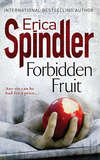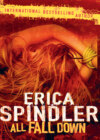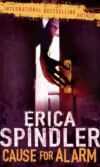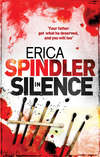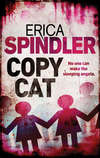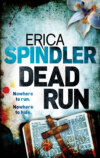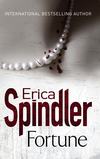Читать книгу: «Forbidden Fruit», страница 2
Chapter 2
Philip August St. Germaine III had an idyllic life, one of those existences so untroubled that others commented enviously on it. He had the right family, all the right and best things; he was healthy, athletic and handsome enough. He had sailed through school, in part because of native intelligence, but more because of the charm he had acquired through breeding.
In truth, Philip had never had to work for anything, not for grades or girls or a living. Everything had been handed to him not only on a sterling platter—the St. Charles being the crown jewel on that platter of glittering gems—but with an adoring smile. For Philip, the years flowed effortlessly one into the other.
Far from being bothered by his lack of effort in shaping his own life, he accepted it all graciously, as his due and his wonderful lot in life. He did feel for those poor souls who struggled and suffered, and he never forgot to give—and give plentifully—to the Church, both in thanks for his bounty and as a sort of insurance policy against guilt.
Frankly, until thirty-six hours ago, Philip August St. Germaine III had thought, with justifiable arrogance, that nothing ugly or unhappy could ever touch him.
Now, as he stood at the maternity ward’s nursery window and watched a stranger feed his baby, his beautiful, perfect daughter, that same arrogance mocked him. Now, he felt as if his idyllic life was crumbling around him.
The last day and a half had been like a nightmare from which he couldn’t awaken. The wife he adored, usually sweet-tempered and genteel, had become a person he didn’t recognize. A person who frightened him.
He brought a hand to his head, heavy and aching from stress and lack of sleep. It wasn’t only that she had cursed at him, spitting out words he would have sworn she didn’t, and couldn’t, know. It was more than the fact that she had told him she hated him when he had tried insisting they pick out a name for their child.
No. It was the way she had looked at him, an almost maniacal light burning in her eyes, that frightened him. Because when she’d looked at him that way, he had felt, deep down in his gut, that the life he had known was gone forever.
Philip jammed his hands deep into his trouser pockets and gazed at his daughter, sucking greedily on a bottle of formula. She was the image of her mother already. He couldn’t understand how Hope could look at her with such horror, how she could recoil from touching her. He pressed the heels of his hands to his burning eyes. When she looked at their precious daughter, what did she see that he didn’t?
If only he could understand, if only he could crawl inside his wife’s head, maybe he would be able to help her. And then, maybe, his world would stop rocking around him.
Her behavior had come out of nowhere. She had looked forward to the birth of their first child. Her pregnancy had been an easy one; she had suffered from neither morning sickness nor mood swings. They had talked about all the things this child would do and be. Other than her absolute conviction that she carried a boy, her attitude about motherhood had seemed completely normal.
Now this. A shudder of fear moved over him. What would he do if he had lost her? If the woman he had known and loved so desperately had ceased to exist forever? How would he go on? He loved her beyond reason; he had from the first.
Inside the nursery, the attendant finished feeding and burping Philip’s daughter and laid her in her crib. Philip watched, seeing instead Hope as she had looked the night they first met. He had been in Memphis on business; they’d been introduced by friends. She had been laughing, her head tipped to the side, her long, silky hair falling softly against her cheek. He’d had the urge to touch it, to bring the dark strands to his lips to test their texture and taste. He could recall the exact rose shade of her mouth, could recall the way she’d pursed her lips in amusement, could remember that he had become aroused just watching her speak.
She had turned and met his eyes. He’d sensed that she knew exactly what he was thinking, that she was glad he was thinking it. In that moment, he had fallen madly in love with her. It had been as simple, and as complicated, as that.
That night and for the remainder of his business trip, they had been inseparable. He had told her everything about himself, and she had shared her life with him. The tragic story of her parents’ accidental death while traveling in Italy, of how she had been left alone in the world at seventeen, had touched him deeply.
Something about her had made him feel like the most powerful, the most important man in the world. He had wanted to shield her from the harsh world, had wanted to protect her from all of life’s unpleasantness. He had wanted to bring her into his charmed circle.
If he had been a less cautious man, he would have proposed on the spot. Instead, he had waited six long, agonizing weeks.
Family and friends had thought him insane until they met her. Then they, too, had fallen under her sweet spell. Even his demanding, ever-critical parents had thought her the perfect choice.
Not that it had mattered what they thought. He had been prepared to defy them, he had been prepared to give up everything for her.
Their wedding night had been an experience beyond his fantasies. She had done unimaginable, incredible things to his body, yet with such sweet, almost tentative innocence, that he had felt as if he were deflowering a virgin. Even now, standing in plain view of the world, his life in turmoil, thinking of that night brought swift, stunning arousal.
Sometimes he felt as if his life revolved from night to night, from one opportunity to make love with her to the next. Those times when she couldn’t—or wouldn’t—were a kind of torture beyond his previous experience. No woman before Hope had had such a hold on him; it was as if without her his heart couldn’t beat.
“There you are.” Hope’s doctor came up to stand beside him. Harland LeBlanc had delivered a host of St. Germaine babies, and although nearly sixty, he looked a decade younger. Since the man was considered the top obstetrician in New Orleans, Philip took some comfort in knowing Hope had the best care available.
The older man motioned to the nursery. “You have a beautiful daughter, Philip. In fact, I don’t think I’ve ever seen a more beautiful infant.”
Philip looked at the other man, then returned his gaze to the nursery window. “Yet, Hope can’t bear to look at her. She’s yet to hold her. She won’t even consider a name.”
“I know it’s been difficult, but—”
“Difficult?” Philip said, his tone caustic. “I don’t think you do know, Harland. I don’t see how you can. You weren’t there this morning when Hope swore at me. When she told me she hated me. All because I wanted to pick out a name for our daughter.” He drew a painful breath. “The way she looked at me was…chilling. I never thought my wife would look at me that way.”
The physician laid a hand reassuringly on Philip’s shoulder. “Believe it or not, I do understand what you’re going through. I’ve seen this type of behavior before, and it will pass. Everything is going to be all right, Philip.”
“Are you so certain of that?” Philip drew a hand across his forehead. “What if it doesn’t pass? I couldn’t bear to lose her. She’s everything to me, she’s—” He cleared the lump from his throat, feeling exposed and foolish. He shifted his gaze to the nursery and his sleeping daughter. “I love my wife, Harland. Too much, I sometimes think.”
The doctor gave Philip’s shoulder a comforting squeeze, then dropped his hand. “What Hope’s going through isn’t as uncommon as you might imagine. A surprising number of women experience depression after childbirth. On occasion, the depression is so severe, so all-encompassing, the woman abandons her family. Or worse.”
Philip met the other man’s gaze once again. He lifted his eyebrows at the physician’s solemn expression. “Worse, Harland?”
“Women in the grip of this blackness have killed their newborns, Philip. As horrifying and foreign as that may seem.”
Philip made a sound of shocked disbelief. “Surely you’re not suggesting that Hope might…that she could…kill our child?”
“Of course not,” Harland said quickly, his tone confident. “But I do think we should keep her here a few more days. We need to monitor her. Just to be sure.”
Dear Lord. Just to be sure? Of what?
Fear thundered through Philip, taking his breath, stealing the remnants of his peace of mind. Harland LeBlanc, Philip realized, considered top in his field, a doctor who had seen everything, was worried. More worried than he wanted to let on.
Philip breathed deeply through his nose, working to steady himself. But Harland didn’t know Hope the way he, her husband, did. All she needed was a return to normalcy. She needed to be surrounded by her things and the people who cared about her.
“Do you really think that’s necessary, Harland? Hope needs to be home. Our baby needs to be home. Once there, Hope will adjust. I know she will.”
“What if she doesn’t? Postpartum depression is caused by the tremendous imbalance of hormones in a woman’s body. Hope has no control over these feelings she’s having, she’s awash in them. She’s not trying to be difficult or unreasonable.”
The doctor shook his head. “What if I send her home too early and she doesn’t adjust? What if I send her home and the unspeakable happens? I don’t want to take that chance.” He met Philip’s gaze evenly. “Do you, Philip?”
The unspeakable. Or worse. Philip swallowed hard. “No. Of course not.”
“Good. Your wife needs you now. You say you love her, well, now’s the time to prove it.”
Philip willed away his frustration and selfish fears. Hope needed him. His daughter needed him. He had to be strong. “What can I do?” he asked. “Just tell me what I can do.”
“Be supportive. Understanding and loving. I know it’s hard, but you must remember that Hope is not in control of her emotions. She’s as frightened as you are right now. Probably more. She needs time. She needs your patience and love.”
Philip turned his gaze to his sleeping daughter, so tiny and helpless his heart broke for her. She needed her mother. She needed to go home. “And if my love and support aren’t enough? What then, Harland?”
For a moment, the physician said nothing. Then he sighed. “They’ll have to be, Philip. Right now, you don’t have any other options.”
Chapter 3
Hope awakened with a start. Breathing hard, clammy with sweat, she moved her gaze over the dimly lit room, expecting to see the outfittings of the third-story bedroom she had grown up in. Instead, she saw the simple, functional furnishings of her hospital room.
Hope drew in a deep, shuddering breath, relief spiraling through her. She was in New Orleans. She was Hope St. Germaine; the River Road house was far away. Part of a previous lifetime, someone else’s lifetime.
Hope drew in another deep breath, the effects of the nightmare still clawing at her. In it, she had been back at The House, crouched low and spying on a couple having sex. Only, in the dream, it had been her daughter on the bed, her daughter performing the lewd sex acts.
Yet, when her whore-child had looked over her shoulder, as if sensing Hope’s spying gaze, it was her own face Hope had seen staring back at her.
Making a helpless sound of fright, Hope pulled herself into a sitting position. She clutched the bedding, willing away the image from the dream. She knew what was happening to her; she knew why, night after night, she was being tormented with nightmares of the past she had left behind.
The Darkness was upon her, taunting and challenging. It thought it had won already.
No! Hope brought her trembling hands to her face. She wouldn’t let The Darkness win. She couldn’t. She had worked too hard for all she had achieved to succumb now.
Hope hugged her knees to her chest. She rocked, her head pressed to her knees, her mind whirling. Who could she turn to for help? Who could she trust? Philip was losing patience with her. Their family and friends were acting strangely, distant and suspicious. She saw the questions in their eyes. She saw the disapproval in their expressions. How long until someone uncovered the truth about her past? How long until the life she had built for herself crumbled to bits beneath her feet?
She had to accept her child; she had to behave like a doting, besotted mother. She had to behave as if she didn’t see her daughter’s vile core, pretend she didn’t see that the beautiful fruit was spoiled by worms.
Tears, hot and bitter, welled up in her eyes and slipped down her cheeks. But when she held her daughter, how would she keep her revulsion from showing? How would she be able to hide her despair and feign affection? She couldn’t; she knew she couldn’t.
Hope threw aside the covers and climbed out of bed. She crossed to her half-open door, the linoleum floor cool against her bare feet. She peeked out at the deserted hallway and nurses’ station. She heard a woman’s weeping from down the hall, heard another’s comforting murmur.
The Vincent woman had lost her baby. Philip had shared that information with her earlier today, she supposed in the hope of making her thankful for their own baby’s good health. Instead, she had wished it was her own child who had been taken. If the Lord had chosen her baby, her problems would have been solved.
But the Pierron daughters were strong with The Darkness that beat inside them; the Pierron daughters never died.
She had to escape, she thought, frantic suddenly. She had to get out of this place and breathe fresh air; she needed to be away from the constant prying, the insufferable compassion, of the hospital staff. She had to find someone who would understand and help her.
The church. She could turn to the church. The priest would help her. He would understand.
And in the anonymity of the confessional, she would be safe. Her secret would be safe.
Whimpering with relief, Hope turned away from the door and moved blindly to her closet. She rifled through it, pulling out her street clothes, tugging them on as quickly as she could, fumbling in her haste. Throughout her life the Church had been her solace, her rock during times of turmoil and confusion. Surely this time would be no different. Surely the priest would know what she should do.
But what if, this time, the priest couldn’t help her? What would she do then?
Fear pumped through her, taking her breath, her ability to think, to act. She struggled to get control of her emotions; she couldn’t afford to fall apart now. If she did, The Darkness would have her.
Never. Taking a deep, steadying breath, Hope crossed to the phone and as quietly as she could, called a cab. That done, she collected her purse and tiptoed to the door. Luck was on her side—the nurses’ station was still empty. Smiling to herself, she ducked out of the room and went quickly to the elevator. She didn’t want Philip alerted to the fact she was leaving the hospital. He would try to stop her; the hospital staff would try to stop her. None of them understood.
As she had hoped, the elevator was unoccupied. It whisked her to the lobby; she stepped out and started for the double glass doors directly ahead. A security guard stood at the front desk, flirting with the receptionist. Neither spared her more than a glance.
Hope pushed through the doors and stepped out into the humid New Orleans night. Air, thick with moisture, enveloped her like a womb. She breathed deeply, grateful, so grateful, to be free.
She moved away from the building, out of its circle of light, and the dark swallowed her. Moonlight glistened on the wet pavement; tree branches, their leaves heavy with a recent rain, hung low, their loaded leaves splattering her as she walked beneath them.
A streetcar rumbled past; a youth darted across the avenue, shouting a greeting to another passing in a car. From the canopy of oak leaves above her came the sound of some small animal scurrying for deeper cover.
The cab drew to the curb. Hope slid inside. “St. Louis Cathedral,” she instructed, then settled against the worn seat. In hopes of catching the faithful either in anticipation of their sin or in repentance of it, the Jackson Square cathedral heard confessions into the night. She had always thought it ironic that New Orleans’s oldest, and to her mind, most awe-inspiring cathedral stood sentinel at the very heart of debauchery.
Hope clenched her hands in her lap. The cab smelled stale, like old cigarettes and mildew. The driver said little; his silence saved her having to rebuff him. She turned her face to the window and watched as the grand residences of uptown gave way to the high rises of downtown, then to the old-world architecture of the Vieux Carré, or French Quarter.
Within minutes, the driver drew the cab to a stop beside the cathedral. Hope asked him to wait, then stepped out into the night. She lifted her gaze to the church’s mighty spire, feeling a measure of relief already. St. Louis Cathedral stood watch over Jackson Square, just as a chaperon would over a pair of anxious teenagers, just as the Catholic church had always stood watch over the eternal souls of the faithful. Rebuilt twice from ashes and once from the rubble wrought by a hurricane, its rigid lines provided a stark contrast to the whimsical ironwork of the buildings adjacent to it. Hope had always thought of this church as a type of anchor, its rigidity balancing and securing the lives of the laissez bon temps roullé Creoles who had once inhabited the Vieux Carré.
Taking a deep breath, she hurried toward the church’s welcoming portal, her heels clicking on the cobblestone walkway. From the Mississippi River, located just beyond the square to the east, came the lonely call of a barge; from nearby Bourbon Street, she caught the strains of Dixieland jazz and raucous laughter.
As she entered the church, those sounds faded, leaving a silence that echoed, that reassured. A sense of calm, a feeling of serenity flowed over Hope. Her agitation, the desperation that had held her in its grip for days now, melted away. Here, The Darkness couldn’t touch her. Here, nestled in the arms of the church, she would find her answers.
A marble cistern stood inside the entrance. Hope dipped her fingers into the holy water. She crossed herself, and started for the confessionals that flanked each side of the sanctuary at the front.
She slipped into the first she came to and drew the curtain closed behind her. She knelt, facing the interior wall, and bowed her head. A moment later, the panel slid open. Obscured by a screen, she could make out the priest’s form, but not his features. Just as he could not make out hers.
“Bless me, Father, for I have sinned. It’s been two weeks since my last confession.”
“What sins do you have to confess, my child?”
Hope twisted her fingers together, her heart thundering so hard it hurt to breathe. “Father, I…I’ve come to you under false pretenses. I’ve come not to confess my sins, but to seek your counsel. You see, I—” Her throat closed over the words, and she fought to clear it, fear and despair rising in her again, threatening to swallow her.
“I have nowhere else to turn, Father. No one to turn to. If you can’t help me, I don’t know what I’ll do. I’ll be lost.” Hope brought her hands to her face and wept into them. “Please, Father. Please help me.”
“Calm yourself, child. Of course I’ll help you. Tell me what’s troubling you.”
Hope shuddered. “The women of my family are evil and wanton, Father. They’re sinners, they sell themselves, their bodies. It’s always been so in my family, we are cursed women.”
She swiped at the tears on her cheeks. “I escaped, but now I fear for my baby daughter’s eternal soul. I fear she, too, will grow up evil and wanton. I see The Darkness in her, Father, and I’m so afraid.”
For a moment, the priest said nothing. Then he began to speak, softly but with a strength and surety that filled Hope with calm.
“We are all in possession of the darkness, child. Eve offered Adam the apple, he took the Forbidden Fruit and Original Sin was born. Each of us come into the world tainted by that act of Original Sin. We are all unclean. But God sent His only son to die for us, for our sin. Christ is our promise of salvation.”
The priest shifted, Hope heard the rustle of his robes and the click of his rosary beads. “You must help your daughter. You must show her the right path. You must teach her to fight the Serpent.”
“But how, Father?” Hope leaned toward the partition. “How can I help her?”
“You’re her mother. You have the power to mold this child into a woman of high moral character. Only you. You show her the way, teach her right from wrong, holy from unclean. God has sent you this child as a test. Of your strength and of your faith. This child can be your glory or your defeat.”
Hope’s heart began to thunder, and suddenly her path—her purpose—was clear. It wasn’t the Lord who was testing her, it was The Darkness.
She curved her hands into fists, so tightly her nails dug into her palms. Let The Darkness test her, let it taunt and mock her. She wouldn’t lose to it; she wouldn’t let it have her daughter. She would stamp the Bad Seed out of her child, just as she had worked to stamp it out of herself.
This child could be her glory or her defeat.
Glory, she thought, determination rising like a tidal wave inside her. This child would be her Glory.
Начислим
+14
Покупайте книги и получайте бонусы в Литрес, Читай-городе и Буквоеде.
Участвовать в бонусной программе
